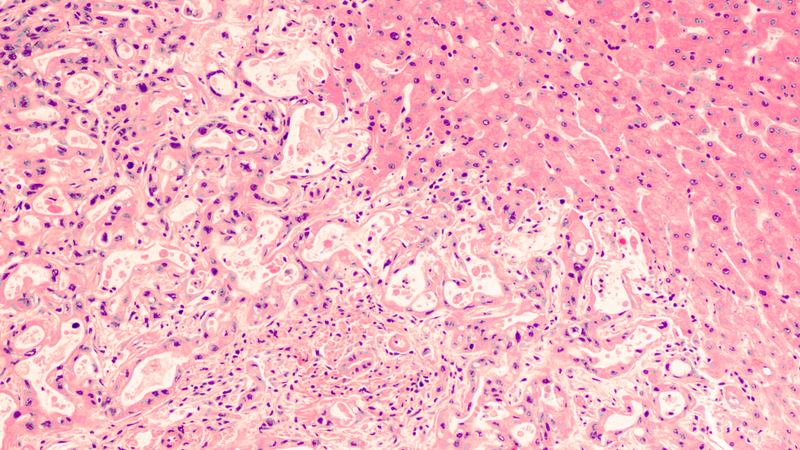Olaparib maintenance therapy extends survival in patients with metastatic pancreatic cancer
ESMO 21st World Congress on Gastrointestinal Cancer Newsroom Jul 12, 2019
Maintenance therapy with olaparib significantly reduced the risk for disease progression or death in patients with metastatic pancreatic cancer, according to data presented at the ESMO 21st World Congress on Gastrointestinal Cancer.

“Metastatic pancreatic cancer is a devastating disease, even today with standard of care treatments with triplets and doublets, you can see a median progression-free survival of approximately 6 months and a median overall survival of about 8-12 months,” explained Talia Golan, MD, The Oncology Institute, Sheba Medical Center at Tel-Hashomer, Tel Aviv University, Israel, and colleagues.
In a previous study, olaparib showed an objective response rate (ORR) of 21.7% in patients with metastatic pancreatic cancer with a germline BRCA1 and/or BRCA2 mutation (gBRCAm). The international, double-blind, placebo-controlled, phase 3 POLO trial is the first study assessing the efficacy of maintenance therapy with olaparib in the same patient population.
A total of 130 patients in POLO received ≥16 weeks of first-line platinum-based chemotherapy for metastatic pancreatic cancer that did not progress before being randomized in a 3:2 ratio to receive maintenance olaparib 300 mg (n=92) or placebo (n=62).
The primary endpoint was progression-free survival (PFS) using modified RECIST by blind independent central review. Objective response rate (ORR), safety and tolerability, and overall survival (OS) were secondary end points. Dr Golan noted that all end points are measured from randomization.
Maintenance olaparib demonstrated a statistically significant and clinically meaningful improvement in PFS compared with placebo (median 7.4 vs 3.8 months, respectively; hazard ratio, 0.53; 95% CI, 0.35-0.82; P = .0038).
The proportion of patients without disease progression at 2 years were 22.1% and 9.6% with olaparib and placebo, respectively.
In an interim analysis of OS at 46% maturity was 18.9 months with olaparib and 18.1 months in the placebo arm. (hazard ratio, 0.91; 95%CI 0.56-1.46; P = .68). The safety of olaparib was consistent with the known profile of the drug.
Treatment with maintenance olaparib was initiated 4 to 8 weeks after the last dose of platinum-based chemotherapy and continued until disease progression or unacceptable toxicity occurred.
The ORR was 23.1% with olaparib versus 11.5% with placebo in patients with disease measurable at baseline (odds ratio, 2.30; 95% CI, 0.89-6.76; P = .103).
Overall, 18 (19.6%) patients in the olaparib-arm and 6 (9.7%) patients in the placebo-arm achieved a response in the full intention-to-treat population. The median duration of response was 24.9 with olaparib versus 3.7 months with placebo, and the median time to response was 5.4 months versus 3.6 months, respectively.
“What’s really remarkable is that in the patients who responded to olaparib, the median time was over 2 years,” noted Dr Golan.
The disease control rate (ie, the proportion of patients with a response, or ≥15 weeks of stable disease or no disease) at 16 weeks was 53.3% versus 37.1% in the olaparib and placebo arms, respectively.
“Maintenance olaparib provided a statistically significant and clinically meaningful improvement in progression-free survival in patients with germline BRCA mutations and metastatic pancreatic cancer whose disease did not progress on platinum-based chemotherapy,” concluded Dr Golan.
“Our results are the first from a phase 3 trial to validate a targeted treatment in a bioselected population of pancreatic cancer, really highlighting the importance of germline BRCA testing for metastatic pancreatic cancer patients,” she added.—Hina Khaliq
Golan T, Hammel P, Reni M, et al. Olaparib as maintenance treatment following first-line platinum-based chemotherapy in patients with a germline BRCA mutation and metastatic pancreatic cancer: phase III POLO trial.
This article is a news release from ESMO 21st World Congress on Gastrointestinal Cancer Meeting. Read the original here.
-
Exclusive Write-ups & Webinars by KOLs
-
Daily Quiz by specialty
-
Paid Market Research Surveys
-
Case discussions, News & Journals' summaries